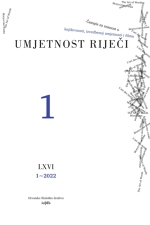Waka Tončija Petrasova Marovića
Tonči Petrasov Marović’s waka
Author(s): Lovro ŠkopljanacSubject(s): Croatian Literature, Other Language Literature, Theory of Literature
Published by: Hrvatsko filološko društvo
Keywords: haiku; seasonal reference (kigo); cut (kire); Issa; Bashō; lyrical subject dehumanization;
Summary/Abstract: The paper discusses a way of recognising and interpreting a literary practice which, according to the established criteria of a given national literary theory and history (such as traditional emission and reception, translation practice, linguistic, geographical or transmission proximity), presents a “foreign body”. In that context, the focus is on the pioneering poetry of Tonči Petrasov Marović, mostly in verse and some of it in prose, that has been influenced by Japanese literary genres generally known as haikai and waka. The paper defines and discusses the following Japanese lyrical forms in his poetry: haiku (hokku), haibun, haiga, jisei, renga, senryū and tanka. Marović’s poetic experiments at the crossroads of Japanese and Croatian literary forms are divided chronologically and as appearing in magazines and collections of poetry. The analysis focuses, among others, on “classical” intertextual borrowings, and innovations such as haiku or waka. Overt and covert influences of Issa and Bashō, the great masters of haiku, are also recognized in Marović’s poems. The paper elaborates on the ways in which Marović’s poetry enters the Japanese intertextual space, especially by using haiku, a Japanese literary form not only dominant in his oeuvre, but also well-known globally. Hence, the paper offers an example of mapping the first “viral” spread of a globally (omni)present literary form.
Journal: Umjetnost riječi
- Issue Year: 2022
- Issue No: 1
- Page Range: 53-78
- Page Count: 26
- Language: Croatian

